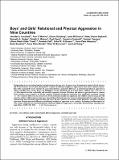Boys’ and girls’ relational and physical aggression in nine countries

View/
Publication Date
2012-07Author
Jennifer E Lansford, Ann T Skinner, Emma Sorbring, Laura Di Giunta, Kirby Deater‐Deckard, Kenneth A Dodge, Patrick S Malone, Paul Oburu, Concetta Pastorelli, Sombat Tapanya, Liliana Maria Uribe Tirado, Arnaldo Zelli, Suha M Al‐Hassan, Liane Pena Alampay, Dario Bacchini, Anna Silvia Bombi, Marc H Bornstein, Lei Chang
Metadata
Show full item recordAbstract/
Distinguishing between relational and physical aggression has become a key feature of many developmental studies in North America
and Western Europe, but very little information is available on relational and physical aggression in more diverse cultural contexts.
This study examined the factor structure of, associations between, and gender differences in relational and physical aggression in
China, Colombia, Italy, Jordan, Kenya, the Philippines, Sweden, Thailand, and the United States. Children ages 7–10 years (N
= 1,410) reported on their relationally and physically aggressive behavior. Relational and physical aggression shared a common
factor structure across countries. In all nine countries, relational and physical aggression were significantly correlated (average
r = .49). Countries differed in the mean levels of both relational and physical aggression that children reported using and with
respect to whether children reported using more physical than relational aggression or more relational than physical aggression. Boys
reported being more physically aggressive than girls across all nine countries; no consistent gender differences emerged in relational
aggression. Despite mean-level differences in relational and physical aggression across countries, the findings provided support for
cross-country similarities in associations between relational and physical aggression as well as links between gender and aggression.
Collections
- Department of Psychology [216]
